Related Research Articles
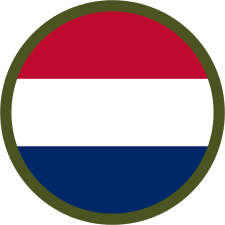
The American Expeditionary Forces was a formation of the United States Armed Forces on the Western Front during World War I. The A. E. F. was established on July 5, 1917, in France under the command of then-Major General John J. Pershing. It fought alongside French Army, British Army, Canadian Army, British Indian Army, New Zealand Army and Australian Army units against the Imperial German Army. A small number of A. E. F. troops also fought alongside Italian Army units in 1918 against the Austro-Hungarian Army. The A. E. F. helped the French Army on the Western Front during the Aisne Offensive in the summer of 1918, and fought its major actions in the Battle of Saint-Mihiel and the Meuse-Argonne Offensive in the latter part of 1918.

The Czechoslovak Legion were volunteer armed forces comprised predominantly of Czechs and Slovaks fighting on the side of the Entente powers during World War I. Their goal was to win the support of the Allied Powers for the independence of Lands of the Bohemian Crown from the Austrian Empire and of Slovak territories from the Kingdom of Hungary, which were then part of the Austro-Hungarian Empire. With the help of émigré intellectuals and politicians such as the Czech Tomáš Garrigue Masaryk and the Slovak Milan Rastislav Štefánik, they grew into a force of over 100,000 strong.

The United States Shipping Board (USSB) was established as an emergency agency by the 1916 Shipping Act, on September 7, 1916. The United States Shipping Board's task was to increase the number of US ships supporting the World War I efforts. The program ended on March 2, 1934.
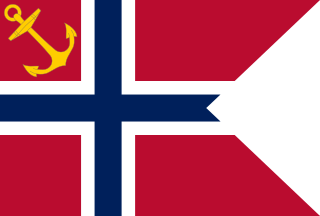
The Norwegian Shipping and Trade Mission (Nortraship) was established in London in April 1940 to administer the Norwegian merchant fleet outside German-controlled areas. Nortraship operated some 1,000 vessels and was the largest shipping company in the world. It made a major contribution to the Allied war effort.
The Minister of Shipping was a British government post created in the First World War and again in the Second World War. In 1941 it was merged into the position of Minister of Transport which was then renamed Minister of War Transport.
The Supreme War Council was a central command based in Versailles that coordinated the military strategy of the principal Allies of World War I: Britain, France, Italy, the United States, and Japan. It was founded in 1917 after the Russian Revolution and with Russia's withdrawal as an ally imminent. The council served as a second source of advice for civilian leadership, a forum for preliminary discussions of potential armistice terms, later for peace treaty settlement conditions, and it was succeeded by the Conference of Ambassadors in 1920.
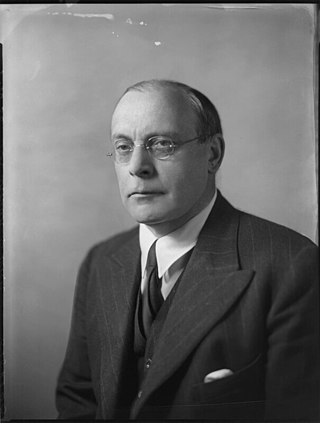
James Arthur Salter, 1st Baron Salter, was a British civil servant, politician, and academic who was involved in many efforts of international economic cooperation, often in conjunction with France's Jean Monnet.
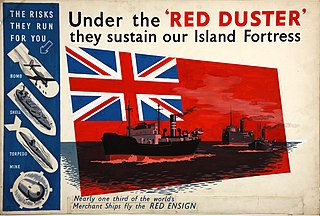
A merchant navy or merchant marine is the fleet of merchant vessels that are registered in a specific country. On merchant vessels, seafarers of various ranks and sometimes members of maritime trade unions are required by the International Convention on Standards of Training, Certification and Watchkeeping for Seafarers (STCW) to carry Merchant Mariner's Documents.
The Ministry of War Transport (MoWT) was a department of the British Government formed early in the Second World War to control transportation policy and resources. It was formed by merging the Ministry of Shipping and the Ministry of Transport, bringing responsibility for both shipping and land transport to a single department, and easing problems of co-ordination of transport in wartime.

The Big Four or the Four Nations refer to the four top Allied powers of World War I and their leaders who met at the Paris Peace Conference in January 1919. The Big Four is also known as the Council of Four. It was composed of Georges Clemenceau of France, David Lloyd George of the United Kingdom, Vittorio Emanuele Orlando of Italy, and Woodrow Wilson of the United States.
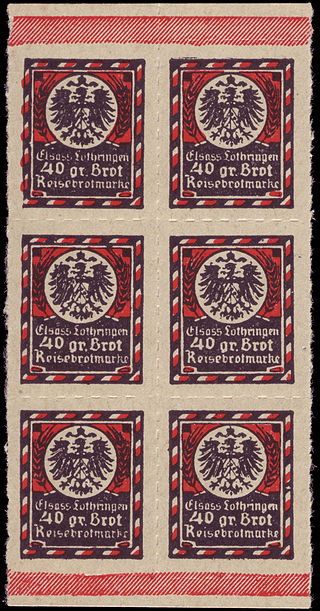
The Blockade of Germany, or the Blockade of Europe, occurred from 1914 to 1919. The prolonged naval blockade was conducted by the Allies during and after World War I in an effort to restrict the maritime supply of goods to the Central Powers, which included Germany, Austria-Hungary, and the Ottoman Empire. The blockade is considered one of the key elements in the eventual Allied victory in the war. The German Board of Public Health in December 1918 claimed that 763,000 German civilians had already died from starvation and disease, caused by the blockade. An academic study done in 1928 put the death toll at 424,000. An additional 100,000 people may have died during the post-armistice continuation of the blockade in 1919.

USS Rijndam (ID–2505) was the Holland America Line (HAL) ocean liner Rijndam, also spelt Ryndam, which was launched in Ireland in 1901 and scrapped in the Netherlands in 1929. The US requisitioned her as the United States Navy troopship USS Rijndam from 1918 until 1919. She was the first of four Holland America Line ships to be called Ryndam.

The Mediterranean U-boat Campaign in the Mediterranean Sea was fought by Austria-Hungary and German Empire against the Allies during World War I. It was characterised by the ability of the Central Powers to raid with near impunity during the first years of the war, causing substantial shipping losses, until the introduction of the convoy system allowed the Allies to drastically cut their losses from 1917 on.
The Supreme Economic Council was established in February 1919 at the Paris Peace Conference by the allied powers Belgium, France, Italy, the United Kingdom, and the United States.

The U-boat campaign from 1914 to 1918 was the World War I naval campaign fought by German U-boats against the trade routes of the Allies. It took place largely in the seas around the British Isles and in the Mediterranean. The German Empire relied on imports for food and domestic food production and the United Kingdom relied heavily on imports to feed its population, and both required raw materials to supply their war industry; the powers aimed, therefore, to blockade one another. The British had the Royal Navy which was superior in numbers and could operate on most of the world's oceans because of the British Empire, whereas the Imperial German Navy surface fleet was mainly restricted to the German Bight, and used commerce raiders and unrestricted submarine warfare to operate elsewhere.
The home front during World War I covers the domestic, economic, social and political histories of countries involved in that conflict. It covers the mobilization of armed forces and war supplies, lives of others, but does not include the military history. For nonmilitary interactions among the major players see Diplomatic history of World War I.

The economic history of World War I covers the methods used by the First World War (1914–1918), as well as related postwar issues such as war debts and reparations. It also covers the economic mobilization of labour, industry, and agriculture leading to economic failure. It deals with economic warfare such as the blockade of Germany, and with some issues closely related to the economy, such as military issues of transportation. For a broader perspective see Home front during World War I.

The German occupation of north-east France refers to the period in which French territory, mostly along the Belgian and Luxembourgish border, was held under military occupation by the German Empire during World War I. This entailed various impositions on the population, including malnourishment, forced labor, and requisitions of property, services, and goods.

George Rublee (1868–1957) was a U.S. lawyer who involved himself with state and national political reform during the Progressive Era (1910-1918) and with international affairs from 1917 to 1945.

Bernardo Attolico was an Italian diplomat.
References
- ↑ "Allied Maritime Transport Council. 2/1918-4/7/1919: Organization Authority Record". catalog.archives.gov. Archived from the original on 2018-06-24. Retrieved 2020-01-24.
- 1 2 3 4 5 Salter, Arthur (1921). Allied shipping control : an experiment in international administration. Oxford: Oxford : Clarendon Press. Retrieved 15 September 2018.